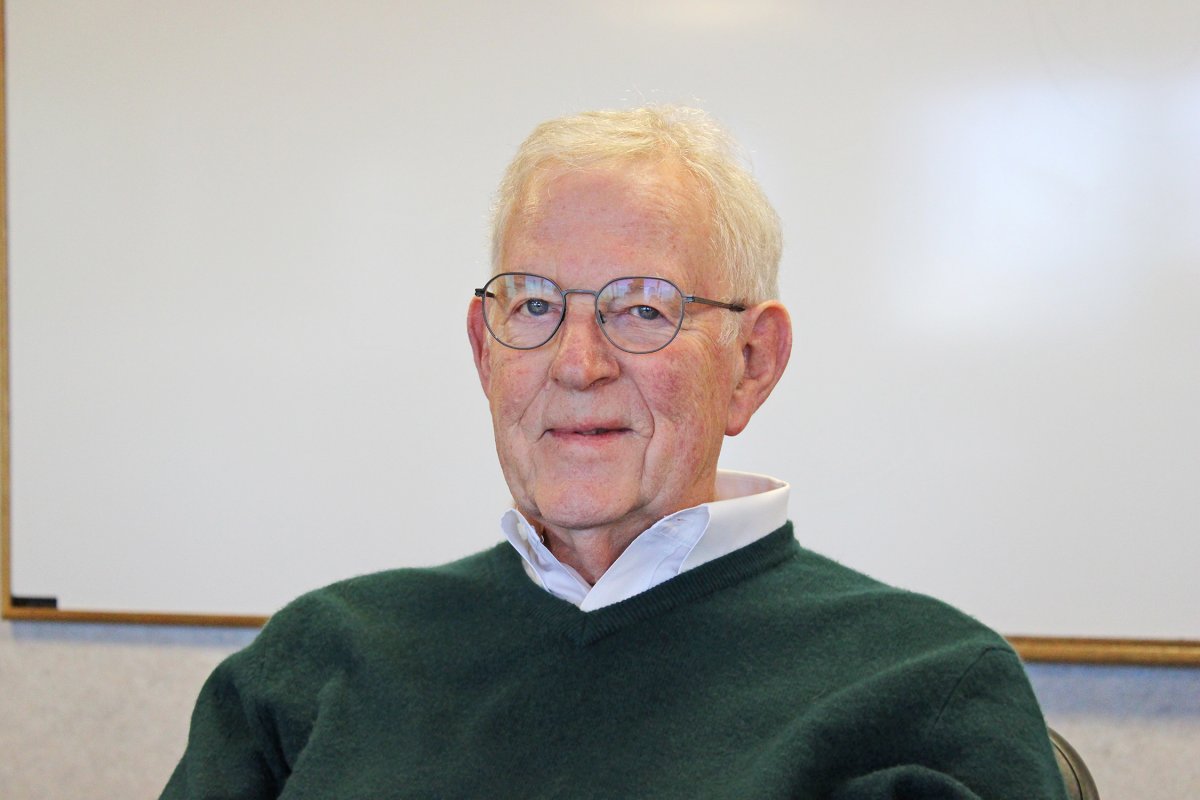Still giving back 30-plus years later

Photo credit: Michael Miltenberger
Learn more about CSE Annual Giving: z.umn.edu/AnnualAddsUp
CSE alumnus and donor Dick Hedger’s ties to Minnesota are strong
May 2, 2023
To understand why Dick Hedger makes regular gifts to the University of Minnesota—35 years and counting—you have to hear his stories. The ties that bind this College of Science and Engineering alumnus to the Twin Cities campus are many, and they start with an ancestor who left Sweden in the 1900s.
“My great grandfather, Emil, left Goteborg and his family in search for a better life when he was in his 30’s,” recalled Hedger. “He ended up in Minneapolis and worked as a carpenter, and -bought a home where WBOB [the U’s West Bank Office Building] is located today.c
Hedger, who holds a bachelor’s degree in electrical engineering, grew up in south Minneapolis. He started at the University of Minnesota in September of 1957, and chose his major at the end of freshman year—mainly, he said, because a friend was in it and the program looked interesting.
His decision to attend the U, though, was his own. Or, more accurately, an easy one.
“I was in Boy Scouts back in the 1950s, and we used to usher at Gopher football games,” Hedger said.
“I started out ushering all the way through junior high and high school,“ he explained. “So I was there every time there was a home game, and I got to sit on the 50-yard line when the game started.”
Hedger’s interest in maroon and gold only grew during that volunteer gig. How could he cheer for any other sports team? Let alone enroll in any other university, he noted. Plus, his dad was a Gopher football season ticket holder in the 1930s—and, oh, Hedger learned the words to the Rouser and “Hail! Minnesota” in grade school.
“The U was the only game in town back in those days,” Hedger said. “There was basketball, football, hockey—there was no Vikings or Twins. My family and high school buddies were often here to do something. So the campus was very familiar to me.”
Two job offers and 2,000 vacuum tubes
Hedger enjoyed his undergraduate years. His class was the last to work with vacuum tubes, which were instrumental in early radio and was the go-to method for amplification before the invention of the longer-lasting, more cost-effective transistors.
“What I really liked about my time at the U was the instructors,” he explained. “They were excellent. What you really learn in engineering school is how to solve problems because the technology is going to change many times over your career, and you will get a very strong basic science education that will help you.”
“My education at the U affected my career in several ways,” Hedger said.
Hedger spent 31 years at IBM Rochester, Minnesota, landing his first—and second fulltime job offer—there.
“I had already accepted an offer to work as an electrical engineer there,” he said. “But then they called, and called again, wanting to know if I wanted to come down and interview for a new development lab, or computation lab. I said, ‘Oh sure’ because between the time I graduated and had to start work, I had a week or two off. So I went down to Rochester to interview and take a test. I didn’t think I’d get the job. It had to do with programming, and I had never taken a programming class.”
Well, he aced that interview too.
Since both the engineering and software jobs were interesting to him, Hedger left the decision to his employer. Soon he was programming computers—starting off with the IBM 709 data processing system, a machine with 16K disk drives, a 32K memory, and 2,000 vacuum tubes.
Goodbye punch cards Gophers
Hedger’s ties to the University of Minnesota would only strengthen, living nearly 100 miles away.
He joined CSE’s (then-called Institute of Technology, or IT) alumni society, sat on the college’s Dean’s Advisory Board, and also started giving back financially.
“It just becomes a habit after you start giving an amount every year,” said Hedger, who also earned a master’s in electrical engineering in 1968 from the U. “I support the parts that I’ve been involved with—the electrical engineering department gets a bit, computer science gets a bit, and the dean gets a bit. But I give primarily to support students.”
“Education is very important, and this is a great place to get it from,” he noted.
Hedger’s wife, Nancy, would no doubt agree with that latter sentiment. She received her degree from the University of Minnesota in 1959. So does his sister, Meredith, who earned her education degree in 1975.
After 31 years of contributing—in time and annual gifts—to the College of Science and Engineering, Hedger doesn’t see the generosity stopping.
“Part of giving now at my age is appreciation for what the U has given me,” he said. “It has allowed me to have a successful career in multiple phases of engineering. I started when all the input was punch cards. I’ve watched and participated in software engineering development since 1962, and it’s now amazing to see what we have in our phones and pockets.”
Learn how you too can participate in CSE Annual Giving at z.umn.edu/AnnualAddsUp.
Story by Pauline Oo
If you’d like to support students and programs in the University of Minnesota College of Science and Engineering, visit our CSE Giving website.
